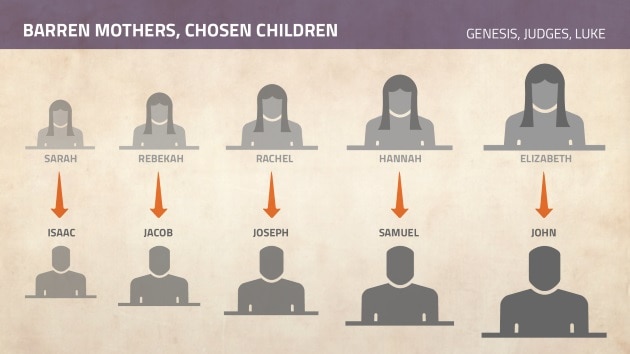
Rachel?s barrenness vividly portrays the fallen state of humanity. Fertility for both land and people was God?s design for His creation (Gen 1:11?12, 28). Yet when Adam and Eve sinned, their action brought God?s curse on human fertility and the fruitfulness of the land they cared for (Gen 3:16?19). Only with great effort would people coax the land to produce, and only in great pain and even danger would women birth children. The fruitful blessedness of creation gave way to the desolate consequences of sin.
Rachel is one of six women in the Bible whose barrenness God overcomes. The stories of these women and their miracle sons weave a story of God?s redemptive power to bring life from death.
The Bible?s first barren woman is Sarah, Abraham?s wife (Gen 11:30). At the very headwaters of God?s redemptive plan to bless the fallen world stood a barren woman. It would take a miracle for God to even begin to keep His promise, but He did it. From the barren womb of Sarah, God brought the son of promise, Isaac.
Sarah?s successor, Rebekah, was also barren (Gen 25:21), but through the prayers of her husband, Isaac, Rebekah birthed twins. Jacob, the younger son, came out fighting for his own way, and he kept at it for much of his life. Renamed Israel, he was an appropriate namesake for the nation that would also fight stubbornly for its own way.
Like her two matriarchal predecessors, Rachel was barren (Gen 29:31) until God opened her womb with Joseph. It was through this long-awaited son and the adverse circumstances of his life as a captive in Egypt that God preserved the fledgling tribes of Israel during the years of severe famine in Canaan.
After Rachel, barren women disappear from the biblical story until the desperate days of the judges. When enemies of Israel threatened to destroy them, God visited the barren wife of Manoah and promised a son that would deliver the people (Judg 13:2?23). Through Samson?s supernatural strength, God protected the Israelites from their archenemies, the Philistines.
At the end of the period of the judges, barren Hannah pleaded for a son, whom she promised to give back to God (1 Sam 1:2, 5, 11). God raised up Samuel to speak His word and intercede for His people in those dark days when people who spoke the word of Yahweh were rare (1 Sam 3:1).
The sixth barren woman in the Bible is Elizabeth, the mother of John the Baptist (Luke 1:7). Her story echoes that of the first barren woman, Sarah, who was also long past the years of childbearing. Her son, was the voice calling in the wilderness to prepare people for the coming of the Messiah.
This block of stories culminates in the story of a miraculous birth from ?innocent barrenness,? the virgin womb of Mary. While each son of a barren woman played an important role in the life of historic Israel, each also pointed to the Savior who was to come, Jesus. Isaac foreshadowed the perfect sacrifice of Jesus on the cross, but unlike Isaac, Jesus was the provided lamb. Jacob had 12 sons who formed the foundation for the national people of Israel, but Jesus chose 12 men as the foundation of a new people of God that transcends ethnic boundaries. The cruel mistreatment Joseph suffered at the hands of his brothers paved the way for their eventual rescue from certain death; Jesus? suffering and death at the hands of His ?brothers? (His people) made a way for all people to be rescued from certain death. Samson delivered the nation of Israel from the Philistines for a season, but Jesus has delivered us from sin?s bondage forever. Samuel was the first prophet in an era of men and women who proclaimed Yahweh?s words to the people of Israel, but Jesus was the fullness of God?s Word for all people for all time. John the Baptist insisted that his message only prepared the way for one greater than himself: Jesus.
Jesus? life, death, and resurrection were God?s final provision for the human condition of spiritual barrenness. Jesus broke the hold of sin and death, the barrenness of human existence, and offers the fullness of life that God intended for His creation from the beginning. The story of the Bible ends with the image of a flourishing, fruitful city and a beautiful bride (the Church, being God?s people) prepared for her husband (Jesus). Barrenness will be gone forever.
* * *
Adapted from Jacob: Discerning God?s Presence. Act now to get the complete curriculum for less than half its regular price through Community Pricing!





